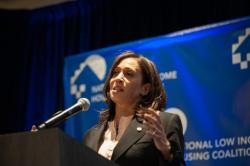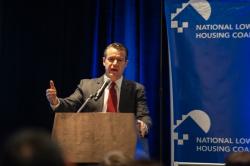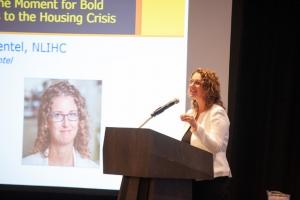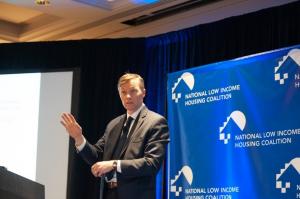Hundreds Convene to Seize the Moment for Bold Affordable Housing Solutions in Washington, DC, March 27-29
Apr 08, 2019
Nearly 500 affordable housing advocates and providers, resident leaders, researchers, and policy makers from around the country attended the NLIHC 2018 Housing Policy Forum: Seizing the Movement for Bold Solutions, which took place in Washington, DC, March 27-29. A broad cross-section of NLIHC members and partners engaged with policy makers, experts, and one another; participated in more than a dozen sessions and workshops; and met with lawmakers on Capitol Hill to urge them to take bold action to address homelessness and housing poverty in America. Senators Kamala Harris (D-CA) and Todd Young (R-IN) provided two of the keynote addresses during the Forum.


The Policy Form began with a Special Session for Resident Leaders from across the country to discuss the steps the current administration has taken to reposition HUD—specifically public housing. Former HUD Assistant Secretary for Public and Indian Housing Sandra B. Henriquez and NLIHC Senior Advisor Ed Gramlich discussed what was on the horizon for public housing and why residents need to be involved in the conversation. National Alliance of HUD Tenants (NAHT) President Geraldine Collins and NAHT Vice President Charlotte Rodgers discussed how tenants in privately-owned, HUD multifamily housing as well as public housing tenants facing Rental Assistance Demonstration (RAD) conversions can work to secure affordability, repairs and improved management. Pamela Phillips, a resident leader of Marble Hill Houses in New York City and founder of Changing the Narrative, shared creative ideas on how residents can inform and educate advocates, policy makers, and other stakeholders about the benefits of affordable housing. The session wrapped with resident leaders joining NLIHC state partners for a screening of Owned: A Tale of Two Americas—a new documentary on the history of racial discrimination in housing in America. National Fair Housing Alliance President and CEO Lisa Rice led a discussion with the film’s director, Giorgio Angelini.
NLIHC President and CEO Diane Yentel kicked off the broader Forum with an address about “seizing the moment for bold solutions to the housing crisis.” While threats and challenges abound – the erosion of the social safety net, more frequent and severe disasters, the increase in homelessness in many areas, the crumbling public housing infrastructure – she said, “I’ve never felt so hopeful and so certain we will achieve big, positive change - because, in fact, we already are.” She cited the 10% increase to HUD’s budget in FY18 and FY19; the 50,000 new housing vouchers for low-income people with disabilities, veterans and youth experiencing homelessness; the protection of funding to the national Housing Trust Fund; new legislation to renew the Protecting Tenants in Foreclosure Act and to expand and permanently authorize the Family Self Sufficiency program; proposed legislation to ensure more equitable disaster housing recovery; new funding for a voucher mobility program; and the defeat of the Administration’s proposed rent hikes on low-income families. “All told, our work together over the last year means new housing for nearly 100,000 deeply poor renters . . . and 5 million low-income families won’t be subject to cruel rent hikes,” she said.

Diane lauded local advocates for achieving unprecedented affordable housing wins in their own states and communities – in New Jersey, Florida, Maine, Ohio, New York, California, Massachusetts, Minnesota, Washington, Oregon, Texas and “others too many to name.” She spoke about how NLIHC and our partner are raising the issue of race and racial inequities in new and important ways. And she spoke about the growing Opportunity Starts at Home multi-sector affordable housing movement and “powerful new partners” calling for federal action to ensure families have affordable homes.
All of these efforts and more are “changing the narrative and building the political will,” she said. She cited a major increase in media coverage over the last two years, how a new public opinion poll shows overwhelming support for federal action on affordable housing, how members of Congress are responding with remarkably bold new legislative proposals, and how presidential candidates are addressing the housing affordability issue in their campaigns as never before (showing a video clip of examples). “It’s an extraordinary moment, one filled with tremendous challenge and exhilarating possibility,” she concluded. “With your continued partnership, advocacy and organizing, big change is within reach. We’ll seize it together. . . . We will end homelessness and housing poverty!” Read Diane’s remarks in their entirety here: https://bit.ly/2YQJcz4
After a presentation by Senator Todd Young (R-IN) (see separate article in this Memo to Members and Partners), the first plenary panel of the Forum featured an in-depth discussion on Achieving Racial Equity in Housing Policy. NLIHC President and CEO Diane Yentel moderated the conversation with Marc Dones from the National Innovations Service, Amanda Misiko Andere from Funders Together to End Homelessness, Christina Rosales from Texas Housers, and Don Chen from the Surdna Foundation. The panelists all emphasized that addressing racial inequality is essential to achieving housing justice. “We want to end housing poverty and homelessness. This won’t happen unless we center racial equity,” said Ms. Andere. She said racial equity can only be achieved by consciously disrupting the power dynamics and systems that hold people of color back. Marc Dones noted that people of color are at a much higher risk of facing homelessness than whites even when they have higher incomes because their networks are less likely to be able to provide financial support during crises. Ms. Rosales shared stories of her work in Latino communities along the Texas border and emphasized the need to use a racial equity lens when allocating disaster housing recovery dollars. Mr. Chen said that focusing explicitly on race and the racial-equity implications of grant awards as a funder has been transformative for his and the Surdna Foundation’s work. The panelists emphasized that voices of people of color who are directly impacted by policies must be included and centered in every step of the policy-formulation and implementation process and that everyone in the room must “get comfortable with uncomfortable conversations” about racial inequities and power dynamics to achieve real, systemic change.
In a workshop titled Revitalizing Neighborhoods and Preventing Displacement, attendees learned about and discussed local strategies to conduct “development without displacement” strategies that expand the supply of available rental housing without driving out long-term residents. Panelists were Randy Shaw, co-founder and executive director of the Tenderloin Housing Clinic and author of Generation Priced Out: Who Gets to Live in the New Urban America, and Council Member Gregorio Casar of the Austin City Council. Mr. Shaw elaborated on many of the organizing successes featured in his book, emphasizing the importance of advocates confronting NIMBY homeowner associations that stand in the way of affordable housing development and urging attendees to consider the importance of rent-control policies to protect residents from rapid rent-price gouging. Council Member Casar detailed the ways Austin’s policies prevented the development of rental housing, like antiquated zoning codes that require excessive parking space, restrict building heights, and limit the numbers of unrelated roommates. The discussion among participants and panelists was lively, with attendees exploring various options for zoning reforms and development policies to take back to their communities.
In another workshop, National Housing Trust Fund [HTF]: Getting Started Building Homes, NLHIC Senior Advisor Ed Gramlich provided a review of NLIHC’s Getting Started report and a recent supplement on how states used their inaugural 2016 HTF allocations. With just $174 million available for 2016, 1,918 HTF rental homes for extremely low-income residents are either completed or in the pipeline, most targeting homeless people, people with disabilities, elderly people, and veterans. Leonard Robbins from the Urban League of Essex County, NJ, discussed an HTF acquisition and rehab project in Newark that will have units exclusively serving people re-entering the community from incarceration, with the Urban League and others providing supportive services. Holly Glauser from the Pennsylvania Housing Finance Agency described her agency’s combination of HTF dollars with housing tax credits and the agency’s goal to have 50% of the projects located in rural or suburban communities. Ms. Glauser noted there were 35 requests for Pennsylvania’s 2017 HTF allocation but funding sufficient for only six projects. Virginia Sardone from HUD provided an overview of the results of a HUD survey of state housing finance agencies (HFAs) citing a need for a dedicated stream of rental assistance for HTF homes and concerns about the 30-year affordability requirement. Ms. Sardone acknowledged that HUD’s interim rule defining “operating cost assistance” was too narrow and that the agency would seek input on how to best modify that definition when finalizing the HTF rule in the future.
In a workshop titled Organizing Wins: Our Homes, Our Voices Housing Week of Action, attendees learned about the goals and messaging components of the Housing Week of Action from NLIHC staff and heard from advocates about the events they organized in 2018. Brenda Clement from Housing Works Rhode Island spoke about the event she organized with two other organizations to honor U.S. Senator Jack Reed for his leadership on the creation of the national Housing Trust Fund. Andreanecia Morris from Housing NOLA described a Week of Action mock debate she moderated between two historical leaders of New Orleans. The take-away: marginalized communities have been dealing with oppression for decades, and future generations should apply past leaders’ insights and wisdom to current problems, like the affordable housing crisis. Mindy Woods, an organizer with the Resident Action Project in Washington who had experienced homelessness herself, described a resource table she set up at the local library during the Week of Action to share resources available to people experiencing homelessness. All three presenters emphasized that the Week of Action events were just part of the many advocacy efforts their organizations conducted throughout the year, and that consistent engagement is key to effective advocacy. Workshop participants asked for and received feedback on ideas they had for the Week of Action, strategies to garner media coverage, and ways to engage people with lived experiences.
Another workshop offered three times during the Forum featured Undesign the Redline, developed and presented by Designing the WE. This exhibit and facilitated exploration of it invited participants to learn the history, effects, and possibilities for “undesigning” redlining in America. It explored how racism in the U.S. became structural through redlining, where redlining fit in a history of devaluing and disenfranchisement, and how it was combatted by people with another vision for society. The session provided an exploration of alternative models, policies, practices, and entities that could “undesign” this legacy. The session was facilitated by Designing the WE co-founder Braden Cooks.
The first day of the Forum concluded with a networking reception and address by Senator Kamala Harris (D-CA) (see separate article in this Memo to Members and Partners).
Day two of the Forum started with a series of workshops, one of which was on New Research on Housing for Extremely Vulnerable Populations featuring a panel of researchers who discussed the living arrangements of individuals and families who cannot find affordable and accessible housing in their communities. Sheila Crowley, former NLIHC president and CEO and a professor at Virginia Commonwealth University, talked about families living in motels who are not technically homeless according to HUD despite not having a permanent home. Kevin Martone, executive director of the Technical Assistance Collaborative (TAC), discussed the challenged faced by people with disabilities living in institutional settings because of the lack of affordable and accessible housing. Cindy Quezada, director of research and special projects at the Central Valley Immigrant Integration Collaborative, discussed unconventional housing like converted garages. Families living in unconventional housing are not counted by the U.S. Census, which means the distribution of federal funds to local communities do not account for their needs.
The workshop Creative Ways to Get your Story Out featured Molly Parker, a reporter for The Southern Illinoisan; Celeste Wesson, radio editor, producer, reporter, and podcaster; and Angela Tucker, producer, writer, and director. These experts from various media spoke to a full room of advocates about how to keep the affordable housing message top-of-mind in the media, how to effectively use storytelling, and why visuals are so important when sharing the story of others. The audience asked questions on how to leverage the new media attention on affordable housing and how to pitch and produce new stories to different outlets. “Check out the reporter’s background to confirm [he or she] is still on the same beat and has complementary interests,” Ms. Parker suggested. “Do not neglect local papers or reporters. And research and pitch ‘people’ stories as those are what will resonate with reporters.” Ms. Tucker added, “It’s important to develop collaborations and feel comfortable about the team you’re working with to tell the story.” Ms. Wesson suggested advocates incorporate solutions to give the story positivity and hope. The panelists agreed that when telling a story about a community, it is important to connect with a variety of community members and bring into the story different perspectives—e.g., residents, organizers, landlords, and even public officials.
In a workshop titled Federal Fixes for Equitable Disaster Recovery, Chrishelle Palay, director of the Houston HOME Coalition and NLIHC board member, moderated a panel featuring Adi Martinez from the Fondo de Acceso a la Justicia in Puerto Rico, Ilene Jacobs from California Rural Legal Assistance, and Trey Reffett from the Office of U.S. Senator Brian Schatz (D-HI). The panel discussed some of the obstacles low-income communities face following a disaster and the need for increased investments in affordable housing to prevent displacement. Ms. Martinez explained how the colonial history of Puerto Rico has impacted disaster recovery following Hurricane Maria and noted that the current administration acts as though Puerto Rico is out to steal from the federal government. Ms. Jacobs agreed, adding that FEMA seems to operate under the assumption that disaster survivors are lying. She stressed the need to learn from previous disasters and to stop repeating preventable mistakes. Mr. Reffett observed that the mission conflict between HUD and FEMA and the lack of coordination between federal agencies allow more vulnerable people and those with additional needs to fall through the cracks of the current recovery system. He and the other panelists offered several solutions, including increasing the number of HUD staff dedicated to disaster housing recovery and codifying the Community Development Block Grant–Disaster Recovery program.
In a plenary session titled Capitol Hill Insiders Panel, four experienced Capitol Hill staffers shared their perspectives and predictions on federal affordable housing policy and on opportunities to increase investments in the coming year through the appropriations process, housing finance reform, or an infrastructure package. Joe Carlile, who works for Chairman David Price (D-NC) on the House Appropriations Subcommittee on Transportation, Housing and Urban Development (THUD), spoke passionately about the need for Congress to reach a bipartisan agreement to lift the low spending caps that would make it much more difficult to fund housing programs at the levels necessary. Jason Woolwine, who has long worked with Chairwoman Susan Collins (R-ME) on the Senate Appropriations THUD Subcommittee, said there remains a high level of uncertainty about when Congress would reach such an agreement and whether any agreement would provide sufficient funding for housing programs. Beth Cooper, who works on the Senate Banking Committee for Ranking Member Sherrod Brown (D-OH), and Esther Kahng with House Financial Services Committee Chairwoman Maxine Waters (D-CA), spoke about opportunities to increase investments in the national Housing Trust Fund and Capital Magnet Fund through housing finance reform.

Dr. Matthew Desmond, author of Evicted: Poverty and Profit in the American City, gave a keynote address about his work at the Eviction Lab at Princeton University studying the prevalence and causes of evictions. He focused on three major findings. First, on average, about half of families who face eviction are behind only one or two rent payments – people are being evicted for owing very small amounts of money. While the rates differ depending on location, the nationwide trend demonstrates the need to expand emergency assistance that would help families dealing with financial setbacks stay in their homes. Second, Dr. Desmond said, there are jurisdictions with a preponderance of serial evictions – the same renters being repeatedly evicted – due to policies like low eviction filing fees for landlords, varying attorney requirements, and overly strict regulations on late fees. Third, Desmond said, despite lower property values, rents in low-income communities remain disproportionately high. Even after considering variable costs and appreciation values, the median profit for property owners in low-income communities is still higher than those in higher-income communities. He noted that this trend did not hold true for major cities with hot housing markets, but generally, low-income communities pay more for their housing.
After Dr. Desmond’s presentation, the Forum featured two sessions titled Opportunity Starts at Home: New National Public-Opinion Poll Results and Presentation of 2019 Organizing Awards and Discussion with Honorees. (See separate articles on each of these in this Memo to Members and Partners.)
During a workshop on the Future of Public Housing moderated by Shauna Sorrells, Housing Opportunities Commission of Montgomery County and NLIHC board member, panel members and the audience had a lively discussion on how we can best preserve public housing through current law and new solutions while protecting the rights of residents to live in safe, decent housing. New York City Housing Authority resident Charlene Nimmons discussed the importance of public housing residents leading advocacy for policy solutions to maintain and preserve their homes. She also said existing laws and regulations must be enforced, including HUD’s Section 3 rule that requires public housing agencies, to the greatest extent possible, hire local residents and contract with local contractors and businesses. Molly Parker, a journalist with the Southern Illinoisan, talked about her reporting on the desperate living conditions at the Alexander Housing Authority in Cairo, IL. Deborah Thrope of the National Housing Law Project talked about how the Rental Assistance Demonstration (RAD) was created to preserve public housing and protect residents but noted that those protections have not been adequately enforced in some communities. NLIHC’s Elayne Weiss discussed how Congress has repeatedly failed to provide adequate funding for public housing, and the Trump Administration proposes to eliminate public housing capital funding altogether while “repositioning” 105,000 public housing units through RAD, demolition and disposition, and conversion of units to vouchers by the end of September. Ms. Weiss also touched upon draft legislation to better preserve public housing.
To open a workshop on Elevating Rural and Native Housing Issues, Lance George from the Housing Assistance Council discussed the housing realities in rural America, including a lack of affordability, higher rates of substandard housing, out-migration, and prevalence of manufactured housing. Tony Walters from the National American Indian Housing Council provided an overview of issues related to tribal housing and the need for additional funding for the Indian Housing Block Grant (IHBG), the main housing resource for tribal areas. Mr. Walters explained that the IHBG was created in 1996 as a way to provide tribal governments with greater flexibility, but because funding has not kept pace with inflation, Native communities lack the necessary resources to address their critical housing needs. He urged advocates to include IHBG in appropriations requests and work to ensure state governments allow tribes to access other resources. Rob Wiener of the California Coalition for Rural Housing discussed how his organization and others have worked to increase resources for both rural and tribal areas in the state. Mr. Wiener also highlighted a number of successes achieved in California, including opening up state programs to Native nations and securing rural-specific funding.
The final workshop of the Forum was titled Our Homes, Our Votes Nonpartisan Voter/Candidate Engagement. The panelists were all housing providers who shared how owners and operators of affordable rental housing can engage their residents in voting as a key part of empowerment. Dr. Karen Dubois-Walton from Elm City Communities, the New Haven (CT) housing authority, spoke about how public housing agencies could engage their residents to ensure they are registered and informed voters. She spoke about efforts in Connecticut to automatically register public housing residents to vote as part of the housing approval and lease-up process. Halley Henry from the National Housing Trust & NHT Communities spoke about the perspective of a non-profit housing provider, sharing that voter engagement was just one piece in her organization’s holistic approach to resident engagement and empowerment. She discussed the legal considerations for 501(c)(3) organizations engaging in elections and how to preserve one’s nonprofit status while conducting voter engagement with residents. Andrew Foley from Jonathan Rose Companies described voter engagement from the perspective of a for-profit housing provider. He emphasized the importance of partnering with other organizations and ways to address any potential tensions or confusion with landlords. Mr. Foley shared details about Jonathan Rose Companies’ relationship with local League of Women Voters chapters to help with voter registration, and he discussed efforts to work with Lyft to coordinate rides to the polls for renters in remote or rural areas. NLIHC’s Joey Lindstrom provided an overview of voter engagement tools and resources available through NLIHC’s website ourhomes-ourvotes.org and urged all housing organizations to be more involved in civic engagement.
The Forum concluded with a Capitol Hill Day on March 29 during which advocates from around the country conducted more than 150 meetings with their congressional delegations about the need for bold solutions to the nation’s affordable housing crisis. (See separate article in this Memo to Members and Partners.)
Visit https://www.nlihcforum.org/ for videos and photos from the Forum.